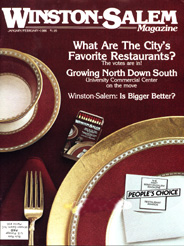Feature Writing
Business Newcomers

What is it like to make a business move to Winston-Salem after working in other parts of the United States? Companies come here for the ideal combination of elements that make up the economic development formula, typically weighing as many as 30 separate factors—state and local tax structures, housing, schools, transportation, building costs, and available office space—before choosing Winston-Salem as the best place to locate.
But according to several “transplants” to the Winston-Salem business community, the city’s true strength as a place to do business has as much to do with attitudes as economics.
Paul Breitbach, who’s worked in Chicago, Peoria and Indianapolis, moved to Winston-Salem in 1983 to become managing partner of the local Price Waterhouse office. While he thinks business is “pretty much the same everywhere,” he says the biggest difference he sees between Winston-Salem and larger metro areas is the more personal approach taken here.
“In terms of business judgment and understanding what makes a business function, the people I deal with in Winston-Salem are as sophisticated as any I’ve dealt with anywhere,” says Breitbach. “The style is just not as formal. People don’t want to get right to the business at hand. First, they want to be sure they can relate to you personally—to see if your value system fits in with theirs. They want to have a comfort level with you as an individual before they’re comfortable doing business with you.”
Breitbach says he’s found the community very receptive to him as he’s sought to involve himself in various community activities. Soon after he came to Winston-Salem, for example, he met with Chamber of Commerce staff members to talk about ways the chamber might expand its role in promoting entrepreneurship. Within two weeks, he was invited to chair a committee organized to help entrepreneurs start businesses in the city.
“As much as they want to know about your qualifications, people around here want to know about who you really are—what kind of values you possess, what degree of honesty and integrity you have,” says Joyce Rubin, a senior associate at Bridge Enterprises, a Winston-Salem-based training and development company. “Who I am is considered a part of my competence.”
Before coming here, Rubin managed a number of small businesses in Rochester, New York. She’s also worked in Albany, New York, Springfield, Massachusetts, Syracuse, New York, and New York City. In spite of some misgivings among her friends, she moved to Winston-Salem in August 1984 after several visits to the area convinced her that she’d like to make the city her home.
“My friends were convinced that all Southern men were patriarchs and all the women were fluffs,” recalls Rubin. “They said, `You’re a Yankee and a woman. What kind of reception do you expect?’ I really didn’t know what to expect, but I’ve found men here have taken me seriously as a business person and a number of the women I’ve met have turned out to be a source of a great deal of social, professional and personal support.
“There’s a people-oriented theme I’ve noticed with CEOs I’ve talked to around here,” she adds. “They seem to be much less product- or production-oriented than the CEOs in New York and much more concerned with developing their employees and helping them achieve their personal goals. They believe if you can have the productivity as well as a positive, harmonious environment, that’s a whole lot more desirable because everybody wins. As a result, I think people around here are generally more satisfied with themselves and with their lives.
“They get as much done, but with a whole lot less strain,” she adds. “There’s a whole lot more consideration for others, more sensitivity and more humor.”
“The traditional Southern lifestyle has a lot to do with what goes on in the executive suites around here,” observes Rich Halverson, president of McMan, Inc., a company that provides management and administrative services to six McDonald’s restaurant franchises, three of which are in Winston-Salem. The others are in Kernersville, Mount Airy and Elkin.
“People get as much done,” he says, “but without having all the pressures. That makes doing business very pleasant.”
Halverson was born and reared in South Dakota. After earning a degree in psychology from the University of Iowa, he began his career as a computer sales representative, first for IBM and later, for RCA. He’s lived and worked in Cedar Rapids, Iowa, Atlanta, Greensboro, and Cherry Hill, New Jersey.
In 1972, when RCA got out of the computer business and, as a result, he was out of a job, Halverson accepted a job offer from two uncles who operated three Winston-Salem McDonald’s franchises.
“Having been in the marketing and sales end of the computer business, I’ve seen lots of management styles and learned a great deal about many different businesses and their approaches to problem-solving,” says Halverson. “People are very competitive here, but they have a certain style and attitude that’s often missing in the Northeast. The bargaining skills are as strong or stronger, but no matter how competitive you are, you don’t overstep certain bounds. Carrying yourself well is always important.”
Halverson thinks Southerners tend to be more loyal to their suppliers and are usually less willing to switch on the basis of price alone. “Here, if another supplier has a lower price, the customer is more likely to want to sit down with you over coffee and decide together what to do about it,” he says. “In New York, you just take the best price. Always.”
“Of course, if a Southerner finds out you’ve been taking advantage of him—if you’ve been breaking the rules—he’ll never forget it, and he’ll never do business with you again.”
Halverson says there’s also more of a tendency among local business people to provide certain “amenities” as part of a business deal. “There’s more of an interest in providing value in the form of a hunting farm customers can visit or tickets to an important game,” he notes. “Those kind of things are a normal part of the business relationship, maybe because around here, if somebody’s done you a favor, you’re expected to honor it.”
“There are a lot of ways to do things,” says Bob Brandquist, who moved here from Pekin, Illinois, last July to become manager of CPC International’s Corn Products Division plant. He’d lived 15 years in Pekin and before that, had lived and worked in Chicago and Corpus Christi, Texas. “The big difference is, people around here seem to know you can do things just as well walking as running. And you can think about what you’re doing while you’re walking.”
Although Corn Products has few local customers, Brandquist has had some exposure to the Winston-Salem business community. Based on his experience, he says there’s “nothing small-town about it at all.”
“I consider Winston-Salem a cosmopolitan place,” he says. “Maybe because there are several large companies headquartered here, people are aware of the world and how they fit in it.”
“People who think Southerners are less aggressive in business are completely wrong,” says Liverpool native David Boden, who moved to Winston-Salem from Philadelphia in November 1984 to become vice president of engineering and technology for Douglas Battery Manufacturing Company. Boden has also lived in Brooklyn, New York, and Manchester, England. “I’ve been very impressed with the amount of hustle and the speed with which people are able to respond to requests,” he adds.
The friendliness of Winston-Salem’s people impressed Boden soon after he moved here. “I’ve had people go out of their way to show me how to get to places,” he says. “In Phildelphia, people are much shorter with you. They might give you directions somewhere, but you’d come away with the impression you’ve imposed on them.”
Rubin echoes Boden’s sentiments. “I walked into Wachovia the second morning I was in town,” she recalls. “I’d been in line only a few seconds when a teller looked directly at me, smiled and invited me to her station. Where I’d come from, I’d have been in line much longer, and it would have been my job to notice when a teller was free. Then, when I got help, I’d have been made to feel like an irritation, even though it was the teller’s job to wait on me.
“People around here don’t correct each other, either,” Rubin adds. “For example, if a waiter forgets to bring you something you’ve asked for, pointing out the error is not acceptable. You either let it slide or just repeat the request. I stopped honking my car horn within 48 hours.”
“In the South, you don’t just march up to somebody and say what you think,” says Halverson. “You have to learn that, or you’ll have a disaster. At first, my wife and I thought people were two-faced. But now we see it’s just a part of the grace, the hospitality.”
“The people here are genuinely friendly and caring,” Brandquist says. “They seem to have a sense of security—a feeling of self-worth that’s a part of their heritage and culture. The attitude here is very up-tempo. It’s a refreshing change.”
“There’s a lot of movement into the city that’s created by Bowman Gray School of Medicine and Reynolds,” says Breitbach. “That’s a real plus because it expands the social structures of the city and makes it easier for a newcomer to fit in.”
Breitbach says he and his wife socialize primarily with other “transplants.”
“It’s not that the natives are unfriendly,” he explains. “It’s just that people who are part of established social circles don’t have a need to work new people in.”
Among the major drawbacks the city faces, Breitbach lists the distance from the regional airport and the necessity of routing all mail through Greensboro. He also sees a need for a broader, more diverse economic base.
“We don’t yet have the same dynamic business environment you see in some cities,” says Breitbach, “but adding more office space and finishing the bypass will be key improvements.”
Warren Steen, manager of public affairs and the Communications Group for the Greater Winston-Salem Chamber of Commerce, agrees with Breitbach that Winston-Salem has suffered from a shortage of first-class office space, but says the city “is making great strides” to correct the problem with One Triad Park—downtown’s “Super Block” project—and I-40 Business Park, near the campus of Winston-Salem State University.
Among the city’s strengths, Steen lists the tax structure, the quality of life, and the spirit of cooperation shared by the local government, the business community and the citizens. He considers the Regional Airport, the availability of skilled workers and the relatively low construction costs to be among the Triad’s chief advantages.
“We tend to focus separately on economics and the quality of the social life when we’re promoting the area,” notes Halverson, “but the attitudes that make the social lifestyle so pleasant carry over into the business world in a positive way that’s very real and very marketable .
“The rat race takes it toll, but you can make a living around here without having to put up with all the unnecessary pressure. That’s what makes doing business here such a pleasure.”
Return to the Winston-Salem Magazine main portfolio page
Let’s Talk About Your Marketing Communications Goals and Challenges!
If you’re looking for help with writing, graphic design and marketing communications and you like the portfolio samples you see here, contact me to schedule a telephone call to explore the possibilities of a collaboration. Of course, there is no cost or obligation for the call.
